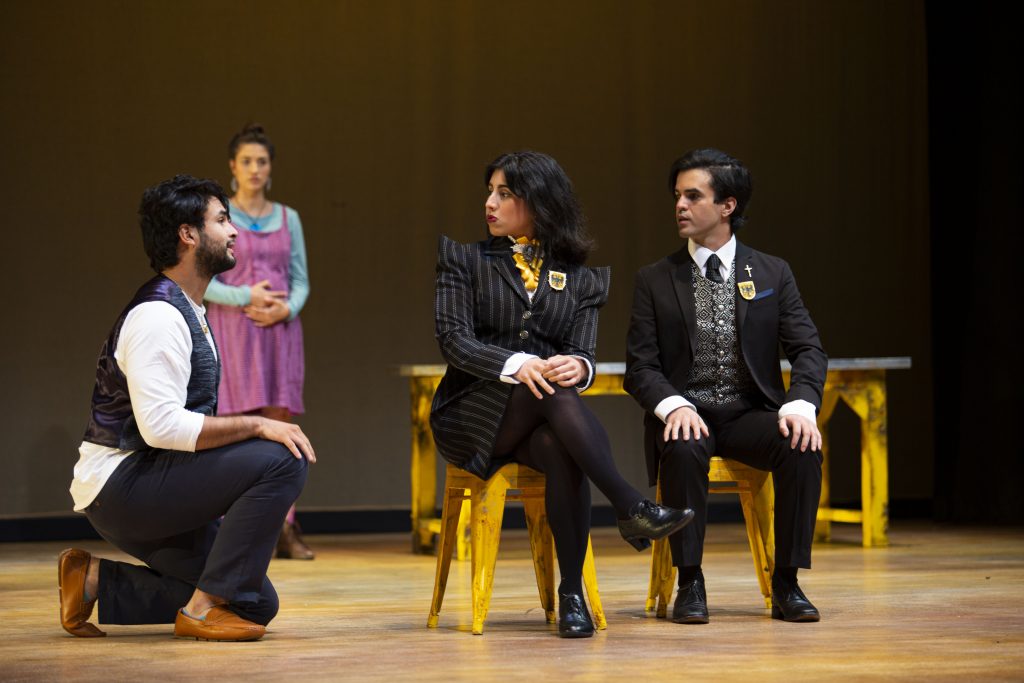Anna Radinsky/Entertainment Director
Parents teaching their children the golden rule of treating others as they should be treated may or may not want to take them to see FIU Theatre’s newest play, “Measure for Measure.”
Unless they don’t mind the sexual tension and dark comedy that comes with watching it.
“This is a really weird, really dark, really problematic comedy,” said James M. Sutton, an FIU associate professor of English who is a Shakespeare and Renaissance expert.
The director of the play, Michael Yawney, was surprised by what audiences found funny and what was found disturbing.
“It’s a play where characters make light of getting their heads chopped off,” said Yawney.
It has been 415 years since Shakespeare brought “Measure for Measure” to the Globe Theatre in London, and yet people still flock to see the show.
The final dress rehearsal was greeted with a full house at the Modesto A. Maidique Campus’s Wertheim Performing Arts Center on Thursday, Jan. 30.
The play is set in Vienna and is about Isabel, a young woman who’s about to fulfill her dreams of being a nun, who has to save her brother Claudio from being executed due to impregnating his girlfriend before they got married.

Angelo, a judge who is in charge of Vienna, falls in lust with Isabel and tells her that the only way to save her brother is to sleep with him.
Shawn Scarpitta, who plays Angelo, said that the play brings to light contemporary issues found in the Me Too movement.
In one moment of the play, Angelo sexually harasses and blackmails Isabel.
“There’s a line that Angelo says in response to Isabel when she says, ‘I will proclaim thee,’ and he responds with ‘Who will believe thee?’ That is one of those moments that I heard people gasp just because that’s something that still goes on in the world today,” said Scarpitta.

Yawney said that audiences that don’t know the script see the play as a romantic comedy until the sexual assault scene arises.
“I think Shakespeare wants the audience to experience the outrage, surprise and betrayal and he wants people to go through that with the characters,” said Yawney.
In another serious moment of the play, Pompey, a pimp who is able to talk his way out of most situations, played by Kyran Wright, defends himself from being whipped.
“I look at Pompey’s character the same way I kind of look at myself. I am a black guy in America just doing what I have to do to survive. For Pompey, he’s really fighting for the fact that he knows that what he is doing is not wrong. I think that as a black man in America, we get judged for a lot of things even when we’re doing things that are normal like driving a car. Pompey is being judged simply because he’s a lower class person and I think I really resonate with that,” said Wright.
Pompey was the most interactive character in the play, often breaking the fourth wall with the audience by asking for their help out of situations and recognizing them from brothels.
Lucio, played by William Guevara, was met with the most oohs and laughter due to his flirty and inappropriate behavior, many times looking like it came off the streets of Miami.
“I kind of saw Lucio as a rich boy that gets whatever he wants. Having been around that scene of being in clubs in Downtown, it’s really easy to examine and pull from that. Diving into his character was really fun for me,” said Guevara.

As for understanding the Shakespearean language, the actors were able to hold the audience’s attention through their body language.
The Bachelor of Fine Arts actors combined Shakespearean language with expressive body language that left the audience riding a rollercoaster of emotions through laughter and tension.
Andrea Saiz, a student from the Miami Arts Studio magnet high school, said that she was able to understand the big picture of the performers despite struggling with the details.
“I was able to follow along with the story and enjoy it because of the blocking and the way that they say the lines. Even if I don’t understand the words, I still get what they’re trying to say,” said Saiz.
Blocking refers to the precise movements and positions of actors on a stage.
By the end of the performance, characters are seen neither absolutely evil nor good.
“There’s no character that’s all good and there’s no character that’s all bad and what I think the appeal of it is that it shows people as they are. Everyone is funny and everyone is tragic at the same time,” said Yawney.
“Measure for Measure” is regarded as a problem play because of its story and its ending.
“Someone always has a happy ending in a Shakespeare play. It’s often not the lead character but there is always some place of joy and I think that allows the play to get so dark,” said Yawney.
The show runs at FIU MMC’s Wertheim Performing Arts Center from Wednesday, Feb. 12 to Sunday, Feb. 16 from 8-10 p.m. Sunday’s shows will run from 2-4 p.m. Cost of admission is $10 for FIU students with ID, $15 for general admission, and $12 for seniors, faculty and staff. Buy tickets at https://carta.fiu.edu/theatre/productions-news/productions/now-playing/.
Photos courtesy of Ivan R. Lopez






Be the first to comment on "Dark Humor And Echoes Of The Me Too Movement Shine In New FIU Play"